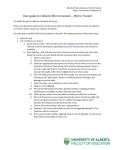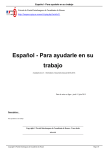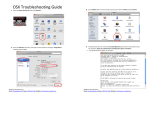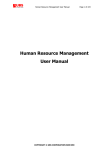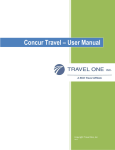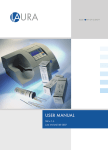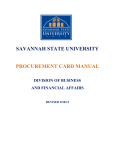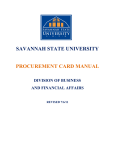Download HRDF User Manual - Human Resource Services
Transcript
HRDF Manual HRS FINANCE & PERSONNEL HRS ORGANIZATIONAL LEARNING AND EFFECTIVENESS Updated November 30, 2012 Contents 1. OVERVIEW .................................................................................................................................. 1 1.1 What Is HRDF? .................................................................................................................. 1 1.2 Who Is Eligible? .................................................................................................................. 1 2. HRDF GUIDELINES .................................................................................................................... 3 2.1 How to Apply for Funding ................................................................................................... 3 2.2 When to Apply for Funding ................................................................................................. 4 2.3 Courses that Will Be Funded .............................................................................................. 4 2.4 Courses that Will Not Be Funded ....................................................................................... 5 2.5 Borrowing............................................................................................................................ 5 2.6 Reimbursements ................................................................................................................ 6 2.7 Travel Claims ...................................................................................................................... 7 2.8 Cancellation of Courses ..................................................................................................... 7 3. USING THE E-HRDF SYSTEM ................................................................................................... 8 3.1 Summary of Application Procedure .................................................................................... 8 3.2 E-HRDF Instructions for Applicants .................................................................................... 8 3.3 E-HRDF for Approvers ..................................................................................................... 15 3.4 E-HRDF Help .................................................................................................................... 17 3.5 E-HRDF FAQs .................................................................................................................. 18 4. ADDITIONAL INFORMATION FOR MANAGERS, ADMINISTRATORS, ETC........................ 20 4.1 Administrative Roles ......................................................................................................... 20 1. Overview 1.1 What Is HRDF? The University of Alberta is committed to learning and development for support staff. As part of this commitment, the Human Resources Development Fund (HRDF) has been established as a negotiated benefit between the University of Alberta and the Non-Academic Staff Association (NASA). HRDF is intended as a mutual benefit to both support staff and the university itself. The purpose of HRDF is to help employees to access learning opportunities (courses, workshops, seminars, in-school apprenticeship training or programs) that will: • • Enhance your capacity to perform work Prepare for an expanded or different role The annual fund of four hundred thousand dollars ($400,000) is renewed at the beginning of each fiscal year, April 1 - March 31, and is subject to review. 1.2 Who Is Eligible? Both Operating and Trust support staff are eligible to apply for HRDF, according to the following table. If you are unsure what employee type you are, contact your HR coordinator or APO. Employee Type Eligibility Timing Maximum Entitlement Casual 1 No Not applicable None Yes When Auxiliary starts $750 per fiscal year* Casual 2 Auxiliary Regular Excluded Employees Yes Yes No When Casual 2 starts When Regular starts Not applicable $500 per fiscal year* $750 per fiscal year Not applicable * Not eligible for borrowing funds from future years. If you move from one employee type to another (e.g. through promotion), your maximum entitlement for that fiscal year is the maximum entitlement for your new position. Entitlements are not pro-rated, but any HRDF funds used prior to promotion will count towards your yearly maximum. For more information about eligibility, please refer to the Operating Agreement (Part A) Article 25, Trust Agreement (Part B) Article 15. English as Second Language (ESL) staff should refer to ESL HRDF User Guide 1|Page Agreement (Part C) Article 19 to determine if they are eligible. Support staff members in positions excluded from the bargaining unit are not eligible for HRDF. HRDF User Guide 2|Page 2. HRDF Guidelines 2. H R D F Gui de l i ne s 2.1 How to Apply for Funding To apply for HRDF funding, you need to complete the application form within the E-HRDF system (https://hrnet.hrs.ualberta.ca/hrdf). If you need additional information, please email ([email protected]) or phone (780-492-4350) the HRDF office. A separate application must be completed for each course, workshop, seminar, or conference prior to the start of the event. Your application should include all the costs for the event including anticipated travel / accommodation costs (see Section 2.7 for further detail). Once your application is submitted it will be reviewed for the following information: • • • Employee type, eligibility, and employee number, Funding entitlement, or remaining entitlement if funds have previously been accessed, and Training request meets the criteria set out in the Collective Agreement. In order to allow time for your application to be processed, you should submit the application form at least 1 month prior to the beginning of the course. The E-HRDF system will notify you when the application has been submitted and again when it has been processed. You are responsible for registering yourself in the course. Either you or your department must pay the up-front costs, unless the course is through the Technology Training Centre (TTC) or the Faculty of Extension, which can invoice HRDF directly. Keep all receipts, as you will need these for reimbursement later. There is no limit on the number of courses that you may take each year, but once you reach your maximum entitlement for the fiscal year, you cannot request funding again until the next fiscal year. HRDF is administered on a first-come, first-served basis. Once HRDF funds are depleted, a notice will be posted on the Human Resource Services website: http://www.hrs.ualberta.ca/Learning/Funding/HRDF.aspx and in the E-HRDF system (https://hrnet.hrs.ualberta.ca/hrdf). The messaging will notify people that there are no funds available for that period and as such all new applications will be declined until the following period. Therefore, depending on the status of the fund, eligible employees may not be able to access funding at that time. HRDF User Guide 3|Page 2.2 When to Apply for Funding For courses/conferences which start between: April 1-June 30 July 1 – September 30 October 1- December 31 January 1-March 31 Applications will be accepted beginning: March 1 June 1 September 1 December 1 E-HRDF will not process any applications prior to the permitted date. 2.3 Courses that Will Be Funded HRDF will cover courses or training that enhance your skills in your current job. Courses and training that are required for your job are not eligible for HRDF and should be covered by your department. HRDF will fund course fees, course materials, in-course examination fees, and where applicable, reasonable out-of-town expense for travel, meals, and accommodation to a maximum of 50%. The following types of courses are generally funded: Job Enhancement • • • • • • • • Conferences, seminars or workshops. Supervisory courses and seminars. Core competency development including: Communication and interpersonal skills. Technology and office organizational skills. Language courses (e.g. French, English, Spanish). First Aid and CPR courses. (Only the initial certification will be funded). Materials, books or supplies required for an approved course. (This does not include large equipment items such as computer hardware). High School upgrading Funding approvals are subject to audit, revision and may be reversed to ensure the appropriate use of the fund. Supervisory Leadership Program HRDF-eligible employees who are not currently supervisors but aspire to supervisory positions may apply for HRDF to offset the cost of taking the Human Resource Services’ Supervisory Leadership Program offered by Organizational Learning and Effectiveness (OLE) http://www.hrs.ualberta.ca/Learning/Programs/Leadership/SupervisoryLeadership.aspx. Support Staff members who already have supervisory responsibilities may take the program free of HRDF User Guide 4|Page charge (no HRDF necessary). Support Staff members who are promoted into a supervisory position may also take the program free of charge. 2.4 Courses that Will Not Be Funded Courses that are required for you to perform day-to-day activities are not eligible for HRDF. Faculties and departments are encouraged to assist in the professional development of their employees by providing the courses and upgrading of skills required to perform day-to-day duties. The following types of courses/expenses will NOT be funded by HRDF: • • • • • • • • • • • • Wellness courses. General interest courses (e.g. hobbies, crafts, recreational memberships). Job-specific training required for the eligible employee’s current role. Training required by legislation for the eligible employee’s current role. University of Alberta credit courses and any associated costs, e.g. books. (Tuition remission for credit courses is available for some employees. For details, see http://www.hrs.ualberta.ca/Learning/Funding/TuitionRemission.aspx.) Miscellaneous expenses like parking or lunch expenses while attending courses within Edmonton. Certification exams or preparation/entrance exams. Re-certification course expenses are not covered. If a specific eligible employee has been designated as the faulty/department representative, the department will be responsible for the funding. Professional association/membership fees. Large equipment items such as computer hardware. Books and materials required for courses for which Tuition Remission has been granted. Books, material or supplies for courses that HRDF did not approve. 2.5 Borrowing If you require funding to take a program of study or attend a conference, the collective agreement makes provision for borrowing of funds for eligible employees. See “Who Is Eligible” above, to see if you are eligible for borrowing. If you are eligible for borrowing, you may request to use your entitlement for the current fiscal and the next fiscal year, to a maximum of $1500, for: a) A specific program of studies offered by an approved post-secondary institution where the program is part of a long-term learning plan that in the judgment of both you and your supervisor meets the criteria outlined in the Collective Agreement. Where the identical HRDF User Guide 5|Page program of studies is available at the University of Alberta, you will access the program locally. If funding for the program is approved, you are required to submit receipts for each course that you take in order to be reimbursed. b) Attendance at a major international conference that, in the judgment of you and your supervisor, is of mutual benefit to you and your department. Where such program or conference is approved, you will not be allowed to apply for funding in the next fiscal year. If you have not submitted an application to use the approved funds within 6 months, your application will be reviewed. Example: An eligible employee may apply for up to $1,500 to attend a certificate program. The eligible employee may be granted up to $750 for the current fiscal year and up to $750 the following fiscal year. In this case, the eligible employee may not apply for funding again until the two year period is complete. This includes eligible employees who did not use the entire $1,500. A maximum of $50,000 is allotted within the HRDF each year for borrowing. 2.6 Reimbursements Once you are approved for HRDF you or your department must pay for the course and request reimbursement from the Fund. (The only exception is for any courses offered by the Technology Training Centre (TTC) or the Faculty of Extension, which can invoice HRDF directly.) Expenses Paid by the Employee Submit original receipts to the HRDF office. Electronic receipts must be printed and submitted. Keep a copy of all receipts for your records. Clearly write your HRDF application number on the back of your receipts. The application number is generated by the E-HRDF system when you submit your application. Submit original receipts to the HRDF office (2-60 University Terrace). The HRDF office must receive receipts within 45 calendar days of the course end date in order to be reimbursed. This deadline is strictly enforced. After this date, the previously approved funds will be made available to other applicants. Reimbursements to the employee are done through the payroll system. Receipts that are received and processed by the HRDF office prior to period cut off will be reimbursed on the following pay cheque. (To view the pay period administration calendars refer to this website: http://www.hrs.ualberta.ca/en/HiringandManaging/PayAdmin.aspx). HRDF is unable to reimburse third parties. HRDF User Guide 6|Page Expenses Paid by the Department The Department submits a copy of their ledger to the HRDF office. Funds will then be returned to the Department via a journal entry to the speed code provided. Employees are encouraged to remind their Department about the 45-day time limit for submitting ledger lines. 2.7 Travel and Accommodation Claims If you are attending a conference or workshop that involves any related travel costs (ie. Airfare, vehicle rental, parking, mileage and/or accommodation expenses), HRDF cannot reimburse you directly as it cannot process travel claims. Your department must pay for travel costs up front, or you must pay the costs and process your travel and accommodation claim using the PeopleSoft financial system. The department then submits a copy of their ledger to the HRDF office for reimbursement. Please note that all travel and accommodation claims will only be reimbursed up to 50%. 2.8 Cancellation of Courses If funding for your course has been approved and your course is subsequently cancelled, please notify the HRDF office. Also, notify the HRDF office if the course start date has been changed or if you withdraw from the course. If you cancel, fail to attend, or do not complete an approved course without legitimate reasons, you will be fully responsible to reimburse the Fund for the full amount that was dispersed to you for the course. HRDF User Guide 7|Page 3. Using the E-HRDF System 3.1 Summary of Application Procedure Complete the HRDF application form within the E-HRDF system and click the Submit button. Once you receive HRDF approval, register in the course. Registration is the employee’s responsibility. If you register prior to receiving approval, you will be responsible for course costs or cancellation fees if the course is not subsequently approved. If you make any changes to your plans (i.e., re-schedule, cannot attend, did not complete, etc.) please notify the HRDF office. 3.2 E-HRDF Instructions for Applicants Access E-HRDF at: https://hrnet.hrs.ualberta.ca/hrdf You will see the following screen where you can login using your CCID and password: HRDF User Guide 8|Page In the left menu, click on New Application to display the HRDF application form. Once “New application” in the left screen has been selected, the following entry screen will appear: Course Title Enter the full title of the course. If you are applying for funding for multiple courses, complete a separate HRDF application for each course. Offered By Select the name of the institution or organization that is offering the course from the drop-down list. The most common course providers are at the top of the list followed by a long list of additional ones. If you don’t see your provider in the list select “Other” (the last item in the top section of the dropdown list). At that point a text box will pop up for you to type in the provider name - enter the complete name; please do not abbreviate. If the course is a credit course for which there is an equivalent course at the U of A, the course cannot be approved unless reasons are given for enrolling in the course at another institution. There will also be a box to enter the Location of the course. If the course is in Edmonton, leave this blank. Otherwise, enter the city where the course is taking place (include province if outside Alberta and country if outside Canada). HRDF User Guide 9|Page Start Date and End Date Enter the start and end date for the course. For single-day courses, enter the same date in both fields (the system will automatically set the end date equal to the start date). If the course has continuous enrollment or is self-paced, enter the dates that you expect to start and end the course. If you make any changes to your plans (i.e., re-schedule, can’t attend, didn’t complete, etc.) please notify the HRDF office. Type Select the type of learning opportunity this application is for by using the drop down menu options. Mode Select the mode of delivery the learning opportunity takes by using the drop down menu options. HRDF User Guide 10 | P a g e Length Select the length of time the learning opportunity will take by using the drop down menu options. Time Off Required Time off for learning opportunities must be granted by your supervisor/authorizer. It is strongly recommended that you hold a conversation with your supervisor before you apply for HRDF. The “Yes” “No” buttons indicate if time off work is required to attend the course. If time off IS required, the system will require the contact information of your supervisor (or other authority) to obtain approval for the time off. The system will then contact the time-off authorizer to confirm approval for time off work. Department Required Training Note that department required courses are not covered by HRDF. Indicate using the “Yes” or “No” buttons, if the course is required training for your job. Employees, in collaboration with their supervisors, are encouraged to identify learning and development plans and potential learning opportunities where the Fund may apply, as part of the on-going performance management process. However, where the employer or legislation requires job specific training, the employer should cover the cost of such training. Purpose Due to the changes in the collective agreement language this field is set for you as job enhancement. HRDF User Guide 11 | P a g e Course Benefit Enter an explanation of how this course is a benefit to both you and your employer. There is no restriction on the length of the course benefit explanation, but should typically be the length of a short paragraph. This section is a good place to talk about your learning plan, to capture how this activity is adding to your job, career and personal development. Once the course details fields are complete in the first section, you will notice a second section on the New Application page outlining the details of payment that looks like this: Course Expenses / Payment Options Under Payment Options, you will be able to select one option only out of the four provided. For U of A courses, either the employee will pay up front, or for Extension, Technology Training Centre (TTC) and Organizational Learning and Effectiveness (OLE) only, the invoice can be sent directly to the HRDF office (2-60 University Terrace). For Off-Campus Providers, either the employee or the department will pay the course fees upfront and then seek reimbursement from HRDF. The department paying option is required if there will be any travel expenses, and may also be used for other course expenses. If department is paying, the system will require contact information for your financial authority (finance office, APO, trust holder, etc.), so they can be contacted to provide information and receive instructions for reimbursement. HRDF User Guide 12 | P a g e Enter the amount and type of any eligible course expenses. Type is classified as either (1) Course/Application/Conference or (2) Materials, books or supplies. The form allows for up to three expenses per course. For additional expenses, complete a new application form. Expenses covered include registration or course fees and reasonable travel expenses (if the course is outside of Edmonton). Travel expenses are considered for courses that are not available locally up to 50%. HRDF does not cover the cost of books and materials required for courses for which Tuition Remission will be granted or has been granted. Books and materials are covered if they are for an approved course, but are not included in the cost of the course. Authorization If you have indicated on the form that you require time off work or that your department will be paying for the learning opportunity, this portion of the form will appear and you will be required to fill in one or both sections as appropriate. Authorization For Time Off Work This section will appear only if you require time off work to attend the course and have selected the “Yes” button in the form. Enter the Name, Email Address and CCID of the individual with the authority to approve your time off. The system will contact them via email to request that they confirm authorization of your time off work. The application will not be processed until the time off authority has provided the approval. Authorization For Department Paying This section will appear only if your department will pay the course fees upfront and then seek reimbursement from HRDF. Enter your Trustholder or Financial Authority’s Name, Email Address and CCID here. The system will contact them to approve the expense. The application will not be processed until the financial authority has provided the approval. HRDF User Guide 13 | P a g e Save or Submit Application At the bottom or top of the application form click on Save Draft if you would like to save the information you’ve entered thus far and continue working on it at another time. The HRDF office will not take any action on draft applications. Otherwise, if you are done filling in the form, click on the Submit Application button; your application will then be forwarded to any approvers (if applicable) and then considered by the HRDF office. Receipts If your HRDF application is approved and after you have paid for the course, remember to submit the original receipts to the HRDF office (2-60 University Terrace). Electronic receipts must be printed and submitted. Keep a copy of all receipts for your records. Receipts must have the HRDF Application Number (generated when you submit your E-HRDF application), your Name and Employee ID written on the back. The HRDF office must receive receipts within 45 days of the course end date to process the reimbursement. Reimbursements are issued on staff payroll. Borrowing If you would like to use the Borrowing option in conjunction with your HRDF application(s), as outlined in Section 2.5 of this manual, click on Borrowing in the left menu in E-HRDF and fill in your reason for borrowing and the amount; optionally you may add comments in the Borrowing Borrowing Allocation Message Notes field If the borrowed funds have been fully utilized, a message similar to the one below will appear in the message board: HRDF User Guide 14 | P a g e Send Message If you have questions or comments about your HRDF application, you may click on Send Message to send a note to the HRDF Administrative Office. A window will appear where you type in a Subject and Message text as shown below. Note that this is an internal message within the E-HRDF system; it is not sent via standard email. This is a better tracking mechanism for the HRDF Office; it ensures that your inquiries are kept with your overall HRDF file, with all of your applications, messages and other history in one place. 3.3 E-HRDF for Approvers Individuals listed as approvers on an E-HRDF application will receive an email notification requesting that they login to E-HRDF to confirm their authorization (for time off or if the Department is paying). If you are requested to do an approval you will access E-HRDF and login with your CCID and password, just as with applicants, at: https://hrnet.hrs.ualberta.ca/hrdf. If you have multiple roles in E-HRDF you may see a screen similar to that shown below; to do an approval you must select the Approver link: HRDF User Guide 15 | P a g e The Approver home page shows a list of new applications awaiting your approval, as shown below: Click on the link under App Num to view the HRDF application and approval details. You will see information about the employee and requested course (title, dates, cost, etc.) followed by the Authorization details that require your attention. If you are requested to approve Time Off you will see the following drop-down list: If you respond Yes, (that you are the appropriate authority to approve time off), you will see a second question as shown below; select whether or not you approve the absence. If you are requested to approve that your Department is paying for the learning opportunity, you will see the following drop-down list: If you respond Yes, (that you are the appropriate authority to approve the expense), you will see a second question as shown below; select whether or not you approve the expense for this employee. HRDF User Guide 16 | P a g e You will then be prompted to enter a financial code (Department Speed Code). Please enter it here: Once you have answered all the approval questions, submit the form. Your screen will return to the Approver home page, if you want to see past items approved, change the filter options. e.g. Next to Filter By Status, click on All to checkmark all the options, then click the Display button to refresh the listing and you will see all new and past E-HRDF approval requests. 3.4 E-HRDF Help If you have any questions about HRDF check the FAQs in the next section of this manual (3.5) or you may contact the HRDF Administrative Office: • • • Telephone: 492-4350 Email: [email protected] Campus Mail: 2-60 University Terrace HRDF Resources: • • • • HRDF Information (public website): http://www.hrs.ualberta.ca/Learning/Funding/HRDF.aspx E-HRDF website (requires CCID login): https://hrnet.hrs.ualberta.ca/hrdf HRDF Manual (PDF): http://www.hrs.ualberta.ca/Forms/HRDF-Manual.pdf HRDF printable application form: http://www.hrs.ualberta.ca/Forms/HRDF-Application.pdf Collective Agreements information on HRDF: HRDF User Guide 17 | P a g e • • • • Operating Agreement (Part A) Article 25: http://www.hrs.ualberta.ca/docs/HR/Agreements/Support/Operating/Article25.pdf Operating Agreement (Common Provisions) Appendix G: http://www.hrs.ualberta.ca/MyEmployment/~/media/hrs/MyEmployment/Agreements/ Support/Common.pdf Trust Agreement (Part B) Article 15: http://www.hrs.ualberta.ca/docs/HR/Agreements/Support/Trust/Article15.pdf ESL Agreement (Part C) Article 19: http://www.hrs.ualberta.ca/docs/HR/Agreements/Support/ESL/Article19.pdf 3.5 E-HRDF FAQs Below are answers to frequently asked questions about E-HRDF: Q1: Applications are approved on a first-come, first-served basis. So when is an E-HRDF application considered received - when submitted by the employee or, if applicable, when all the approvals are received? Answer: The application is considered received only when it is complete with the appropriate approvals, if needed. Much the same as with the paper version, an incomplete application cannot be approved. The first-come, first served approvals will be completed as applications are received. If you are concerned about an approver being away, it would be appropriate for that approving authority to be delegated in their absence, and the employee can change the approver to accommodate that after they have submitted their application (contact the HRDF office to do so). Employees and indicated approvers will receive reminders about the status of the application, and the employee can also follow-up personally with regards to getting the approvals done in a timely manner. Ideally, the employee would have had a conversation with an approver before submitting the application. Q2: What happens if the employee makes a mistake in typing the authorized approver's email address? Do they get a confirmation that so-and-so was sent an email? Answer: The system should send the employee an email stating, "(Name of approver) was sent a request to approve the application at the following email address_______." The system has no way of verifying the validity of the email addresses, so the employee must be diligent in entering the email address and CCID correctly. Q3: Can an employee still access HRDF when on Maternity Leave? Answer: The HRDF is available to support staff employees. If a person is on an authorized leave of absence, they are still considered employees, though they are away from work for a legitimate HRDF User Guide 18 | P a g e reason. They are still eligible to apply for HRDF and take training. Similarly, if an employee has applied for a course and been approved for HRDF funding and their position at the University is terminated, they have a window in which they may still attend that training. Employees in this situation should ask their Employee Relations Consultant if this applies to them. Q4: Can employees from certain departments have authorized approvers and/or financial approvers automatically populated on their applications? Answer: This EHRDF system is meant to be a tool that is available to all employees. We are not prepared to re-write portions of the system to accommodate particular unit needs. The communication process of identifying authorized approvers for departments is an internal one. Due to the amount of mobility for affected staff and changes in positions, the amount of work needed to keep the system up-to-date would negate the benefits of the stream-lined system. Q5: Do the emails received when the application is approved include the 45 day warning for receipts? Answer: The 45 day warning to submit receipts will be in several places along the application process, in addition to reminders the employee will receive. The employee will ultimately be responsible for heeding the submission period. HRDF User Guide 19 | P a g e 4. Additional Information for Managers, Administrators, etc. This section contains additional information for supervisors, managers, APOs, departmental financial staff, human resources coordinators, and other administrators. 4.1 Administrative Roles Supervisors and Managers If an employee plans to take a course that takes place during paid work hours, they should discuss their plans with you prior to applying for HRDF. You have several options for responding to such a request: • • • • • Allow the employee to take the course as regular paid work time; Approve the absence but make arrangements for the employee to make up the time spent away from work; Allow the employee to use vacation or lieu time; Allow the employee to take a leave of absence; or Decline the request. If you approve one of the first two options above, the employee indicates on the HRDF application form that the course is during work hours. They will be asked to enter your name, email address and CCID so the system can contact you. You will receive an email from the E-HRDF system prompting you to log in using your CCID, then confirm that you approve of the employee’s time away from work. You should indicate your approval as soon as you are able to, as the employee’s HRDF application cannot be processed until you do, and a delayed application risks being declined if the fund has been depleted for that period. HRDF does not require supervisor approval for courses taken outside of work hours, during vacation or lieu time, during a leave of absence, or any other non-work hours. Departmental Finance Staff Your department may opt to pay for an employee’s course expenses upfront and obtain reimbursement from the HRDF office. This option is required for courses requiring out-of-town travel expenses (HRDF cannot process travel claims), and may be used for local courses also. For courses requiring travel: the department must either pay the expenses directly or have the employee pay expenses and then submit a travel claim and be reimbursed by the department. For all courses where the department is paying the expenses: the employee still applies for HRDF funding as usual, and indicates on the application form that the department is paying. They will also HRDF User Guide 20 | P a g e need to provide the name, email address and CCID of the finance staff person who will later arrange reimbursement for the department. This may be a dedicated finance person, APO, trustholder, etc. If you are the person indicated by the employee, you will receive an email from the E-HRDF system prompting you to log in using your CCID, then confirm that the department is paying for the course. The system will also ask for the account code that the reimbursement should be made to, and provide you with the HRDF application number. For reimbursement, send a printout or copy of the journal ledger to the HRDF office (2-60 University Terrace). The ledger must have the HRDF application number written on the back. The ledger must be received by the HRDF office within 45 calendar days of the end of the course for reimbursement to be made. This deadline is strictly enforced. If you are unable to meet this deadline for any reason, contact the HRDF office by email ([email protected]) or phone (4924350). Reimbursement will be made via Journal Voucher. HRDF User Guide 21 | P a g e























